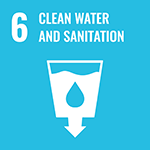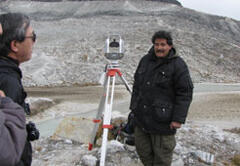Study on the Impact of Glacier Retreat on Water Resource Availability for the Cities of La Paz and El Alto
Principal Investigator
ODA Recipient Country
Plurinational State of Bolivia
Research Institutions in Japan
Tohoku University / Fukushima University / Tokyo Institute of Technology / Nihon University
Research Institutions in Counterpart Country
San Andrés Main University's Instituto de Hidráulica e Hidrología(IHH-UMSA), etc.
Adoption fiscal year
FY 2009
Research Period
5 Years
Overview of the Research Project
Climate change is threatening an enormous reservoir of pure water with extinction
Climate change is causing the glaciers in Bolivia to accelerate melt, and there are concerns that water resources may run dry in the future. One study found a 56% glacier loss in the past 50 years. This project will work to develop monitoring techniques for securing sustainable water resources. Efforts will focus on projecting the amount of glacier melting that will occur in the future and estimating the changes in water demand accompanying urban population growth. The project will also consider reservoir sediment management and water environment, as well as the water quality of alternative water sources, and will include modeling to support water resource policy from a multifaceted perspective.
Water resources viewed from a multifaceted perspective to develop new management models
Satellite data will be used to analyze changes in glacier and snow area in the Andes highlands. The project is also working on projecting the accumulation of sediment in reservoirs, assessing water quality, examining changes in demand for water in the capital La Paz and the neighboring city of El Alto, and conducting water quality surveys of alternative water sources. The results of these studies will be integrated to reveal the impact of melt water from glaciers on water resources, and used in the creation of water resource management models for La Paz and El Alto.
Photo gallery
Research Project Web site
Press Release
Links
Projects
Contact Us
Japan Science and Technology Agency (JST)
Department of International Affairs
SATREPS Group
TEL : +81-3-5214-8085
Related articles by Category
- Climate Change
Environment / Energy
(Climate Change)
 Federative Republic of Brazil
Federative Republic of Brazil
Health Checkup for the World’s Lungs: Measuring the Carbon Stocks in the Amazon Forests
Carbon Dynamics of Amazonian Forests
- Bolivia
Bioresources

 Plurinational State of Bolivia
Plurinational State of Bolivia
Address climate change with quinoa, a highly nutritious crop that withstands harsh environments
Strengthening of Resilience in Arid Agro-Ecosystems Vulnerable to Climate Change, Through Research on Plant Resources and Technological Applications
- Latin America
Disaster Prevention and Mitigation

 Republic of El Salvador
Republic of El Salvador
Protecting international port cities from compound disasters with dominostyle chains of destruction!
Compound Disaster Risk Reduction associated with Large Earthquakes and Tsunamis
- SDGs : Goal.13
Environment / Energy
(Carbon Neutrality)
 Kingdom of Cambodia
Kingdom of Cambodia
Using water management to reduce methane emissions from rice paddies!
Development and Social Implementation of Greenhouse Gas Emission Reduction Technologies in Paddy Fields of West Tonle Sap Lake by Establishing a Large Paddy Area Water Management System






















